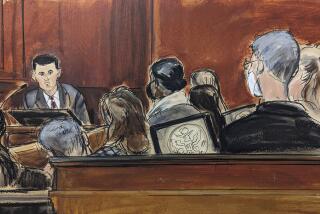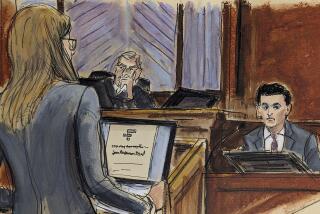Andersen Attorney Foresaw SEC Probe
- Share via
HOUSTON — Arthur Andersen staff attorney Nancy Temple concluded in early October that Enron Corp.’s collapse made it “highly probable” federal regulators would investigate, raising the threat of severe penalties for her firm, according to notes presented by federal prosecutors Monday.
As the trial entered its third week, prosecutors also showed a videotape of an Oct. 10 employee meeting at the accounting firm’s Houston office in which partner Michael Odom said destroying documents can prevent “embarrassing” records from falling into the wrong hands if the firm is sued.
“If it’s destroyed in the course of normal policy, and litigation is filed the next day, that’s great,” Odom said on the tape.
Andersen is fighting a federal obstruction of justice charge for destroying documents related to its audit work for Enron.
Prosecutors introduced notes taken by Temple during an Oct. 9 conference call among the firm’s senior officials. In addition to citing the likelihood of a Securities and Exchange Commission inquiry, the notes indicate that Temple believed it was “possible” that regulators might find Andersen in violation of a settlement it had reached with the agency after botched audits of another client, Waste Management Inc.
The call took place three days before Temple sent an e-mail to a partner in Andersen’s Houston office asking his team to comply with the firm’s document retention policy, which required the destruction of drafts, e-mail and other records deemed unnecessary.
Prosecutors presented Temple’s notes and reams of internal correspondence showing rising anxiety inside the accounting firm as revelations of Enron’s related-party transactions exploded into public view.
Prosecutors unveiled the paper trail as part of a strategy to persuade the jury that top executives were growing wary of regulatory scrutiny and took an active role in planning the firm’s response to the Enron meltdown.
Temple has invoked her right not to incriminate herself and declined to testify in the case.
The notes from the Oct. 9 call could be particularly damaging to Andersen if jurors view them the way prosecutors do.
The Justice Department team contends that Andersen shredded Enron-related documents because the firm, stung by SEC sanctions imposed in the wake of the Waste Management case, feared additional penalties.
But Andersen already has established the basis for a defense by eliciting testimony designed to undermine the image of a firm desperately shredding documents on orders from the top.
David Duncan, formerly the lead partner handling Enron audits and the prosecution’s star witness, told jurors last week that he wasn’t thinking about the Waste Management settlement when he ordered employees Oct. 23 to comply with the firm’s document-retention policy.
Duncan also testified that, after attending the Oct. 10 videotaped meeting with Odom, he didn’t leave thinking he should destroy Enron-related files.
On the videotape, Odom indicates that the firm’s policy allows for the destruction of records until the firm is sued.
Odom has not been called to testify, and it is not clear whether he will be. An Andersen spokesman said it is routine for the firm to record such presentations, which are shared with other offices and sometimes retained for reference.
Duncan said he had received an e-mail Oct. 12 from Odom, forwarded from Temple, that asked his team to comply with the policy. Prosecutors introduced records Monday showing that, about 20 minutes after sending the e-mail to Odom, Temple created a record of a legal claim arising from Enron’s slide.
Prosecutors allege that Temple’s e-mail was intended as a coded signal telling Andersen employees to start shredding Enron files. But Duncan said he initially didn’t act on the e-mail, and added that he launched the office shredding effort only after listening in on an analyst conference call 11 days later in which Enron came under heavy criticism.
Temple’s notes have been one of the more controversial pieces of evidence introduced by the government.
Rusty Hardin, Andersen’s attorney, had told U.S. District Judge Melinda Harmon that she was committing a “reversible error” by allowing prosecutors to discuss the notes and to pose questions about them to another Andersen executive earlier in the trial.
On Monday, Assistant U.S. Atty. Samuel Buell asked an FBI agent on the witness stand to read Temple’s handwriting, but made little attempt to interpret the notes for the jury.
The notes, which covered a series of conference calls among senior Andersen executives mainly during October, describe the issues top managers were grappling with as Enron’s finances collapsed.
In one set of notes from Oct. 1, Temple jotted: “What documents should we keep? Historically keep everything.”
Thomas Bauer, another Andersen executive who participated in some of the calls, Monday invoked his right against self-incrimination.
More to Read
Inside the business of entertainment
The Wide Shot brings you news, analysis and insights on everything from streaming wars to production — and what it all means for the future.
You may occasionally receive promotional content from the Los Angeles Times.










